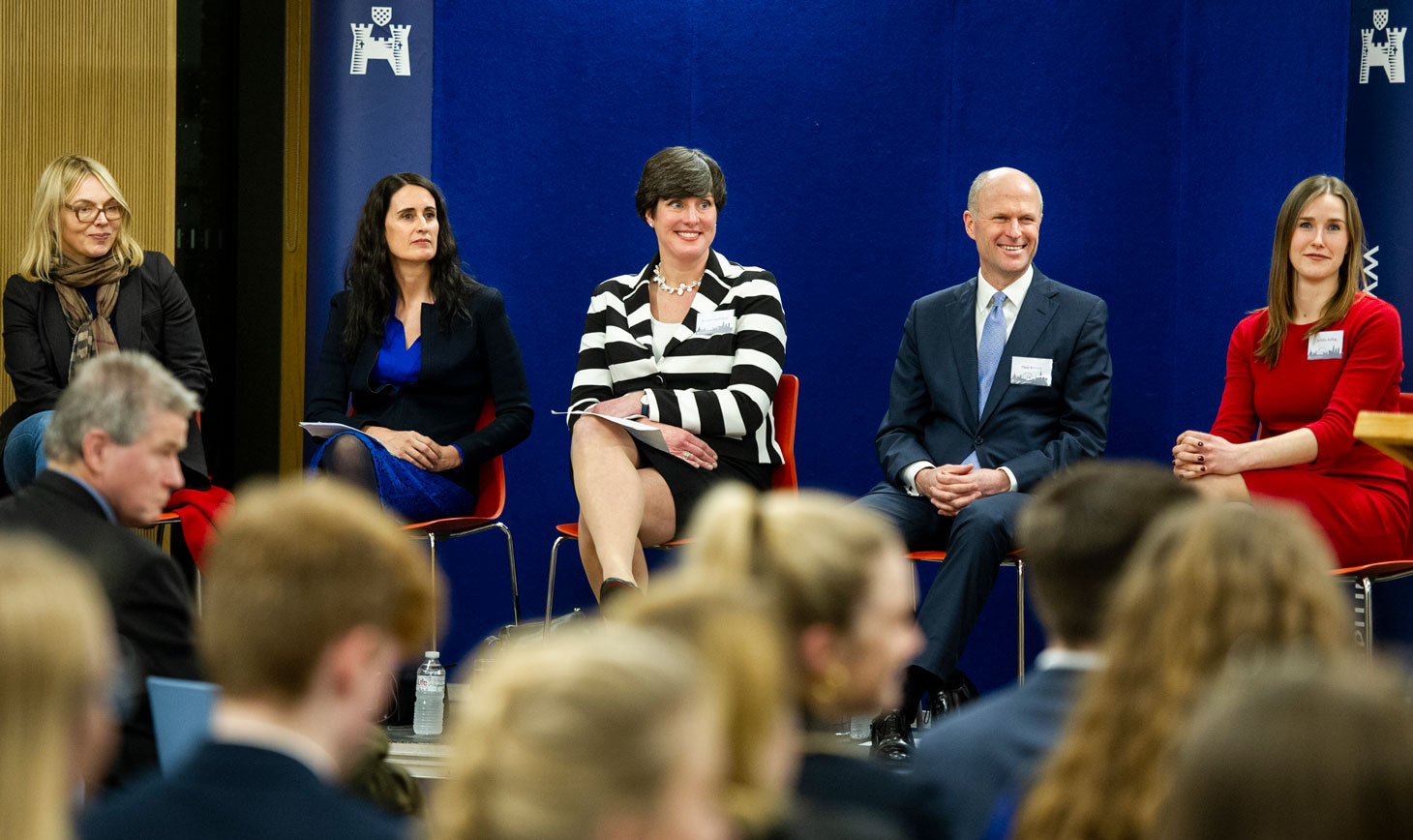
RGSP: Inspiring Minds to Think Big!
The Harrison Centre was buzzing on 5 March as current parents, former parents, former students and current Sixth Formers gathered together for our RGS Professionals event to talk about equality and diversity. Watch the video for footage and feedback from the event.
The wider Inspiring Minds campaign
The Inspiring Minds to Think Big event was part of our wider programme of activities around International Women’s Day and the launch of our Inspiring Minds campaign. This has included careers talks, a Henry Smith Club lecture, spotlight interviews with alumni and a wealth of advice from our community via video. To tap into all of the insights, head to our Celebrating Inspirational Women article.
One Reigatian community – stronger together!
After some networking and nibbles, Head of Foundation, Sean Davey thanked everyone for coming and highlighted the far-reaching benefits of the Reigatian community. He expressed his excitement for this event, which gave current students the chance to network with our Professionals group members and impressed upon Sixth Formers the importance of, “Seizing opportunities like this to talk to people”. He stressed that “Anything is possible, as long as you have belief, aspiration… and maybe a bit of help from the Reigatian community!”.
Insights from the panel
Catherine Hutchison, RGS Foundation Development Executive then introduced our impressive panel of speakers:
- Emma Woods: CEO of wagamama and Non-Executive Director of The GymGroup PLC
- Lesley-Ann Morgan: Head of Multi-Asset Strategy at Schroders
- Joosje Hamilton: Consultant Lawyer at Norton Rose Fulbright LLP and a Land and Property Manager
- Paul Morris: Former Head of the Western Europe Region at Willis Towers Watson
- Camilla Ayling: Equity Analyst at Legal and General Investment Management
Catherine handed over to outgoing Head Girl, Amy B, who showed great confidence and skill in posing questions to each of the panel in turn. While the advice provided was mainly aimed at Sixth Formers, it proved to be thought-provoking for all guests. The take-away points were:
Emma Woods: “A corporate culture that embraces diversity helps drive growth. When staff can rock up to work and be themselves, they feel safer, and are able to give more of themselves. The most brilliant version of myself was aged 18-20. As a marketeer, 80% of my ideas were great, but 20% were rubbish, but being in an environment where I was encouraged to be brave and put forward those ideas was empowering. Follow your passions, find your drive and set big ambitions for yourself.”
Lesley-Ann Morgan: “My current boss is an inspirational woman, and I strive to be a mentor/sponsor to others in my team, but there were very few female role models in my early career. Instead, I took notice of the men who were NOT role models, which taught me about the type of boss I didn’t want to be! My advice is to shake things up once in a while – don’t get too comfortable and set yourself new challenges: ask yourself, ‘What can we learn today?’. Continue to grow by asking questions – be inquisitive!”
Joosje Hamilton: “As a foreigner, I might have been rejected for being different, but the culture at Norton Rose Fulbright was (and still is) to embrace those differences. Everyone, including trainees, is invited to contribute in meetings, which builds knowledge and confidence. You can’t plan your life, so grab opportunities and trust that every new path will lead somewhere if you work hard. Use all the contacts at your disposal to find out about different professions. Don’t be afraid to try new things and be open to ideas.”
Paul Morris: “Being inclusive is good for business – if you can’t attract and retain staff from the full range of talent that’s out there, companies put themselves at a competitive disadvantage. Business leaders need to be authentic and be prepared to reveal their own vulnerabilities; being the loudest in the room isn’t encouraged – be kind and say thank you! There’s no handbook for life.”
Camilla Ayling: “Don’t get caught up on job titles and the idea of a career ladder that only has an upwards trajectory. As Sheryl Sandberg wrote, ‘Careers are a jungle gym, not a ladder’, so don’t reject lateral moves as you don’t know where it might lead. I suffer terribly from Imposter Syndrome: ‘Am I credible? Do I know enough, Do colleagues respect me?’. It’s hard to be what you can’t see, so I aim to be a visible role model and constantly challenge stereotypes. Don’t try to mirror other people in order to fit in – you’ll end up shutting down and being more reserved, which means less dialogue, which is bad for business. My advice would be to believe in yourself and know your value – rely on the fact that the people who put you there have confidence in you. Don’t be afraid to ask for help.”
Questions from Sixth Formers
“How will artificial intelligence affect the current generation of school leavers and how might it be applied within your sector?” There was something of a consensus among the panel, that human qualities involved in meeting people will always play a role in building relationships, trust and loyalty. But advancements in AI will help provide dispassionate insights that will complement those human skills, freeing people up to undertake more interesting tasks!
“How will your company have to adapt to this generation’s passion for sustainability?” Everyone agreed that it wasn’t just the call from younger generations that was already driving change, but more the knowledge that it’s the right thing to do! Paul Morris replied with, “You’re consumers and we want your business, so we have to adapt to meet demand.” Lesley-Ann Morgan revealed that Shroders has already implemented measures such a video conferencing to cut down on flights.
- Our next RGS Professionals event will take place this summer. Please join our Reigate Grammar School Professionals group on LinkedIn to receive invitation to these events.
